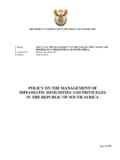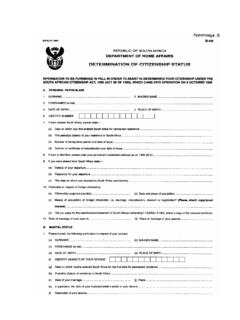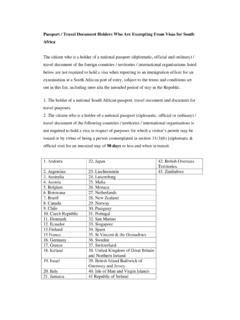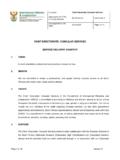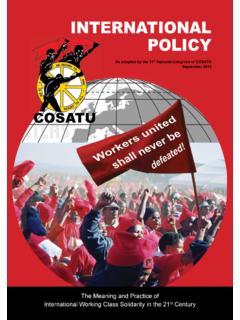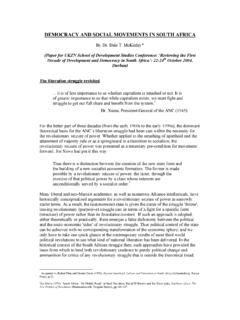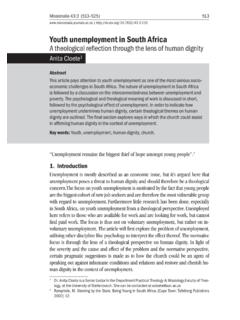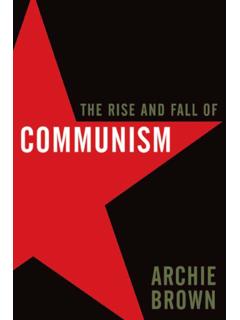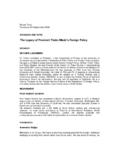Transcription of Input By - Department of International Relations and ...
1 1 THE FOREIGN POLICY OF SOUTH africa FROM 1994 TO 2012 Input By CHARLES NQAKULA HIGH COMMISSIONER OF THE REPUBLIC OF SOUTH africa TO THE REPUBLIC OF MOZAMBIQUE Maputo, March 6, 2013 INTRODUCTION South africa 's ruling party, the African National Congress (ANC) has embraced the concept of internationalism from its inception. The ANC's internationalist outlook, therefore, adopted long before the dawn of democracy in South africa , has since been informing South africa 's foreign policy and positions the country has been taking on the International stage, politically and economically. The building blocks for that internationalism were laid when Pixley ka lsaka Seme, writing about the regeneration of africa described himself firmly and authoritatively as follows: "I am an African.
2 " He was studying in America at the time and his article on the regeneration of africa saw the light of day on April 5, 1906. The article, written in poetic language, was an exhortation to all Africans to rise to the challenges of the new world, using their achievements as a springboard to ascend to the apex of human endeavour in the world. Pointing to africa 's achievements he wrote: "Come with me to the ancient capital of Egypt, Thebes, the city of one hundred gates. The grandeur of its venerable ruins and the gigantic proportions of its architecture reduce to insignificance the boasted monuments of other nations. The pyramids of Egypt are structures to which the world presents nothing comparable.
3 " 2 He added: "I could have spoken of the pyramids of Ethiopia which, though inferior in size to those of Egypt, far surpass them in architectural beauty; their sepulchres which evince the highest purity of taste, and of many prehistoric ruins in other parts of africa . In such ruins, africa is like the golden sun that, having sunk beneath the western horizon, still plays upon the world which he sustained and enlightened in his career." He mentioned other countries on the Continent like the Congo, the Gambia, Bechuanaland (Botswana today) and famous schools in Europe and other countries where African students were studying in preparation of the challenges they would face at home and in the world in the effort to reposition the African Continent.
4 The new spirit of regeneration on the Continent was pervaded by a single "common controlling idea" of the common destiny of the African people, steeped in their "ancestral greatness" Seme argued, adding that: "The regeneration of africa means that a new and unique civilisation is soon to be added to the world." He was looking, therefore, at africa and the world beyond the Continent's borders and was convinced that the new africa would be an equal partner to the other nations and would argue africa 's case with zeal and expertise because: "The African is not a proletarian in the world iof science and art. He has precious creations of his own, of ivory, of copper and of gold, fine, plated willow-ware and weapons of superior workmanship.
5 " PEACE AND DEMOCRACY Questions relating to International peace were highlighted as part of the ANC's response to the Atlantic Charter, which was endorsed by the Allied Nations on January 2, 1942. On the matter of the destruction of Nazi tyranny the ANC argued: "Africans are in full agreement with the war aim of destroying Nazi tyranny but, they desire to see all forms of racial domination in all lands, including the Allied countries, completely destroyed. Only in this way, they firmly believe, shall there be established peace which will afford to all peoples and races the 3 means of dwelling in safety within their own boundaries, and which will afford the assurance that all men in all lands shall live out their lives in freedom from fear, want and oppression.
6 " Dealing with the matter of the abandonment of the use of force in the Atlantic Charter the ANC went on to say: "We are in agreement in principle with the idea of the abandoning of the use of force for the settlement of International disputes, but we do not agree with the idea envisaged in this article of the charter concerning the armament of some nations and the disarmament of other nations as this policy is provocative of future wars" That sentiment of peace and democracy once more dominated ANC discussions when the Democratic Movement held its Congress of the People at Kliptown, south of Johannesburg, on 26 June, 1955.
7 The document that emerged from those discussions, the Freedom Charter, has a clause that says: "There shall be peace and friendship." The concept of peace and friendship is further elaborated on in the document as follows: "[A free and democratic] South africa shall strive to maintain world peace and the settlement of all International disputes by negotiation not war. "The right of all peoples of africa to independence and self-government shall be recognised, and shall be the basis of close co-operation." The question of internationalism finds expression in the South African Constitution where in the preamble the political leaders of the country solemnly declared, among other things, that they would: "Build a united and democratic South africa able to take its rightful place as a sovereign state in the family of nations.
8 " 4 FOREIGN POLICY The South African foreign policy vision is of an African Continent which is prosperous, peaceful, democratic, non-racial, non-sexist and united, and which contributes to a world that is just and equitable. As can be appreciated, this vision springs from the thoughts of many of the ANC's leaders, in the past and during the current conjuncture. There has been no deviation from Pixley ka lsaka Seme's "Regeneration of africa " and further inputs by other ANC thinkers on the concept of internationalism. Delivering her budget speech in Parliament on April 25 last year, the Minister of International Relations and Cooperation, Mrs Maite Nkoana-Mashabane, said among other things: "We are on course towards creating a better South africa and contributing to a better and safer africa and the world.
9 " The ideal of a "better and safer africa and the world" talks to the issues of democracy, peace, security, stability, justice and prosperity on the African Continent and the world, as envisaged in the Africans standpoint on the Atlantic Charter. South africa 's foreign policy, therefore, picks up on those arguments for, as Minister Nkoana-Mashabane said, "continental development and integration, .. the promotion of peace and security in africa , .. enhancement of South-South and North-South cooperation; and advancing South africa 's national interests through participation in institutions of global governance." It is common cause that South africa has been playing a crucial role in mediation and peacekeeping on the Continent.
10 It is also common cause that South africa has answered many calls on the Continent to help to deal with disasters of one kind or the other, including in the field of medicine and humanitarian aid. South africa also pays a lot of attention and focus on matters of governance and makes inputs at various multinational platforms on those matters for the improvement of structures to buttress governance across the globe. South africa 5 has even joined those who have argued for the transformation of some of the multilateral structures in the world, including arguing for the transformation of the UN. South africa has hosted major summits, including the World Conference Against Racism, the World Summit on Sustainable Development, Non-Aligned Movement Summit, the Commonwealth Heads of State and Government Summit, as well as various summits and meetings of SADC, and the historic African Diaspora Summit.
